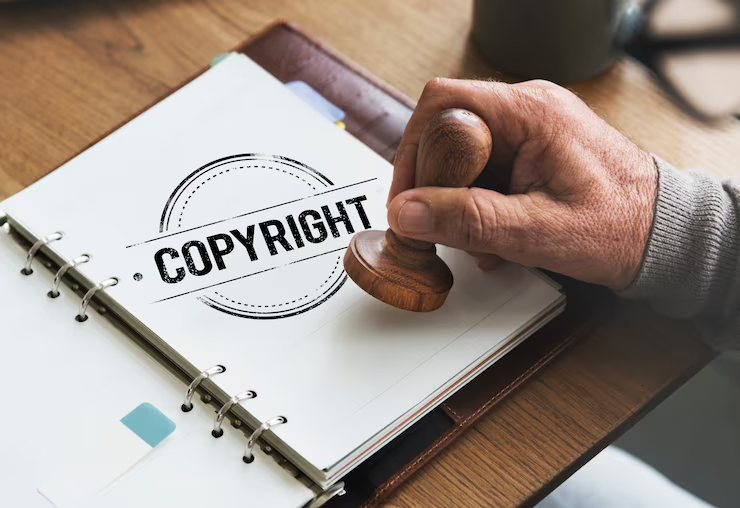
What Is The Process Of Copyright Registration In India?
Intellectual property protection is more important than ever in the present digital era. Protecting your artistic, musical, theatrical, or literary creations requires copyright registration. This in-depth guide will take you step-by-step through the copyright registration process in India, answering frequently asked questions and offering insightful advice.
An Understanding of Indian Copyright Registration
A type of intellectual property protection given to authors of original works is called copyright. The Copyright Act of 1957 is the legal framework in India that controls copyright registration and protection. Although an original work automatically gains copyright protection upon creation, registration offers further advantages and legal standing.
Is Copyright Registration Mandatory?
In India, one of the most frequent queries about copyright is whether registration is required. In India, copyright registration is not required, thus the short answer is no. Once the work is made and fixed in a tangible form, the creator is instantly granted copyright protection.
However, there are several benefits to copyright registration:
- Legal Proof: In a court of law, a registered copyright proves your ownership of the work.
- Public Record: Your copyright claim becomes publicly recorded upon registration.
- Enforcement: In the event of an infringement, it makes it easier for you to assert your legal rights.
- Statutory Damages: In certain situations, registration could give you the right to statutory damages and legal costs in infringement cases.
Also Read: What are the Copyright Laws in India?
What Happens if Copyright is Not Registered?
Although it doesn’t take away your rights, not registering your copyright can make it harder to protect your work:
In the event of infringement, you can be required to submit more documentation attesting to your ownership and the creation date of the work.
In cases of infringement, unregistered copyrights may have access to available limited remedies.
Copyright registration is preferred by certain companies, which will limit your ability to sell or provide licenses for your creations.
Registration Procedures for Copyright in India
Let’s examine the detailed procedure for registering your copyright in India now that we are aware of how important it is.
Step 1: Assess Your Eligibility
Make sure your work qualifies for copyright protection before starting the registration process. You can grant copyright to:
- Literary Works (including software)
- Dramatic Works and musical works
- Artistic creations
- Cinematograph films
- Audio Recordings
Step 2: Get the Application Ready
You must send Form XIV to the Copyright Office to register your copyright. The following details must be included in the application:
- Details of the applicant
- Copyright interest of the applicant
- Class and description of the work
- Title of the work
- Language of the work
- Name, address, and nationality of the author
- Date and place of first publication
- Names of the countries in which the work was first published
Step 3: Provide the Necessary Documents
With the application, you must submit:
- Two copies of the work (if published)
- Three copies of the work (if unpublished)
- Evidence of the work’s creation and ownership
- Power of Attorney
- Prescribed fee
Step 4: Submit the Application
The application can be filed in one of two ways:
- Online through the e-filing portal of the Copyright Office
- Physically at the Copyright Office in New Delhi
Step 5: Review and Complaints
The Copyright Office will review your application upon receipt. If there are any concerns, you will have a chance to address them and make the required corrections.
Step 6: Registration
Your copyright will be registered if the Registrar of Copyrights is pleased with your application and no objections are upheld. A certificate of registration, which functions as initial proof of copyright ownership, will be sent to you.
How Much Does India’s Copyright Registration Cost?
In India, the cost of copyright registration varies according to the type of work and the applicant. The general fees as of 2024 are as follows:
- Literary, dramatic, musical, or artistic works: ₹500 for individuals, ₹2,000 for others
- Cinematograph films: ₹5,000
- Sound recordings: ₹2,000
It is recommended to visit the official Copyright Office website for the most recent information as these fees are subject to change.
Also Read: The Labour Law India Act And Its Implementation Practices
The Significance of Copyright Registration in Different Sectors
1. Publishers and Authors
Registering Copyright is essential for publishers and authors to safeguard their literary works against unapproved dissemination or replication. It offers a strong legal basis for discussions about royalties and licensing agreements.
2. Musicians and Music Label
Copyright registration aids in the protection of sound recordings and compositions in the music industry. A crucial aspect of enforcing rights is addressing unauthorised uses, covers, or samplings in films or commercials.
3. Software Developers
Software developers can add an extra degree of security against piracy and unauthorised dissemination by registering their code under copyright law as a literary work.
4. Designers and Artists
Through copyright registration, visual artists and designers can safeguard their works from unauthorised use or replication in a variety of media.
5. Filmmakers
In the era of digital streaming, copyright registration is essential for filmmakers to safeguard their cinematograph films against piracy and unapproved distribution.
Common Myths Regarding Copyright in India
Myth 1: Your work is protected merely by having the copyright sign © on it.
Reality: Although it’s a fantastic idea, using the copyright emblem doesn’t give you any legal protection. A stronger proof of ownership is provided by registration.
Myth 2: You can register a copyright anywhere in the world.
Reality: Copyright registration in India offers domestic protection. You might have to rely on international copyright treaties or register in other nations to get protection on a global scale.
Myth 3: An idea is protected by copyright.
Reality: Though ideas themselves are not protected by copyright, their expression is. A concrete version of the concept is required for copyright protection to apply.
Conclusion
In India, copyright registration is optional, but it gives creators more legal security and makes it simpler to defend their rights. There are numerous creative fields where the simple approach provides significant benefits. Creators can safely protect their intellectual property and concentrate on their creative endeavours by being aware of and using copyright registration. Remember that aggressive protection in the field of intellectual property is essential for ensuring a safe and creative future.
Now, you may feel confused, wondering where to seek guidance. Thus, you must know that Innerwork Advisors offer the best legal advisory and private investigation services to help you with copyright breaches and ensure compliance with all relevant laws.
Also Read: Laws For Divorce in India: What Can A Women Demand?






